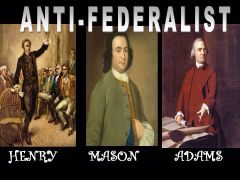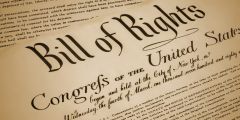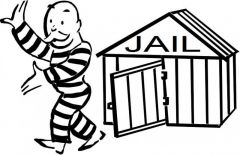![]()
![]()
![]()
Use LEFT and RIGHT arrow keys to navigate between flashcards;
Use UP and DOWN arrow keys to flip the card;
H to show hint;
A reads text to speech;
40 Cards in this Set
- Front
- Back
- 3rd side (hint)
|
Articles of Confederation |
the first constitution of the 13 American states, adopted in 1781 and replaced in 1789 by the Constitution of the United States.
|

|
|
|
ratification
|
act of ratifying, confirmation
|

|
|
|
levy
|
a collection of tax or a perposial of somesort
|

|
|
|
Founders (or Framers)
|
a person who found or established something
|

|
|
|
Virginia Plan
|
James Madison, Edmund Rudloph called for a strong government with 3 branches
|

|
|
|
New Jersey Plan
|
William Patterson called for a single house, and each state had equal votes
|

|
|
|
Great Compromise
|
each state had equal number of votes but number of house of represenatives determin on population
|

|
|
|
Three-Fifths Compromise
|
three fiths of slave population will count when setting direct taxes on the states
|

|
|
|
Executive Branch
|
enforce laws
|

|
|
|
Judicial Branch
|
interpretation of laws
|

|
|
|
Legislative Branch
|
have power to make laws
|

|
|
|
Checks & Balances
|
all branches of a government by vesting in each branch the right to amend or void these acts
|

|
|
|
Antifederalists
|
don't support the constitution
|

|
|
|
Federalists
|
support the constitution
|

|
|
|
Federalism
|
the federal principle of the government
|

|
|
|
majority rule
|
more than half agree with a tax or levy
|

|
|
|
amendment
|
A law or tax put in the constitution
|

|
|
|
Bill of Rights
|
first ten admendments of the Constitution
|

|
|
|
House of Representatives
|
two member represante their state in the house
|

|
|
|
Senate
|
a council of citizens that function in the government
|

|
|
|
Congress
|
national legislative body of a country.
|

|
|
|
Popular Sovereignty
|
the principle that the authority of the government is created by the consent of its people, through their elected representatives
|

|
|
|
Republicanism
|
the governing of a society or state
|

|
|
|
separation of powers
|
the 3 branches of government
|

|
|
|
limited government
|
the governments limits of functions like taxes
|

|
|
|
bicameralism
|
mixed government
|

|
|
|
judicial review
|
A court with judicial review power may invalidate laws and decisions that are incompatible with a higher authority, such as the terms of a written constitution.
|

|
|
|
impeachment
|
when an official is accused of an illegale activity
|

|
|
|
quorum
|
a mininum number of member required to be at a meeting
|

|
|
|
revenue
|
a states anually income
|

|
|
|
veto
|
When the president rejects or turns down a bill or tax
|

|
|
|
naturalization
|
citizenship is granted to a foreign citizen
|

|
|
|
elastic clause
|
Congress has the power to pass all laws necessary amnedment (Article I, Section 8)
|

|
|
|
natural born citizen
|
A person born in America so they are an american citizen
|

|
|
|
electoral college
|
a body of electors chosen or appointed by a larger group.Translate electoral college to
|

|
|
|
Supreme Court
|
A court that major affender of a law may have to go to, they also inforce the laws
|

|
|
|
suffrage
|
the right to vote in an election
|

|
|
|
due process of law
|
have a right to life, liberty, and power
|

|
|
|
bail
|
When you pay a certian fee to get out of jail
|

|
|
|
Constitution
|
A document that has three branches of government so that one many not be overpowered and the constitution is our government TODA
|

|

